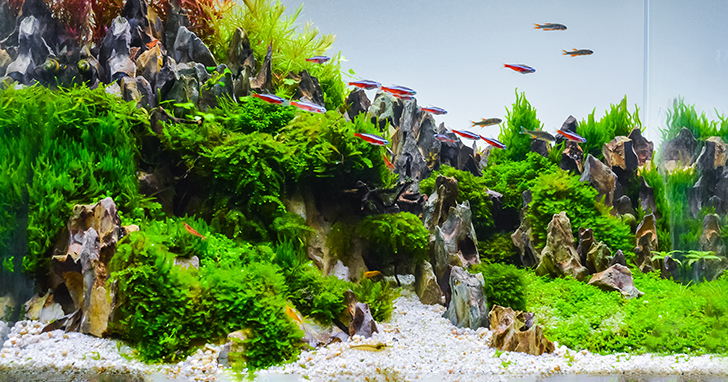Basic Water Chemistry Part 1: Water Hardness

What is water chemistry?
Many beginning aquarium owners dread learning about water chemistry. But just by knowing the basics, you can greatly improve your track record in rearing healthy fish. Since water quality has a direct impact on the health of your fish, it's important for aquarium owners to understand basic water chemistry in order to adjust it correctly and safely. Aquarium owners who learn the basics of water chemistry find it much easier to maintain a healthy and safe environment for aquarium fish. Of course, there are entire books written on the specifics of water chemistry - we encourage all aquarium owners to learn as much as possible about this subject. This article series provides only a brief overview of water chemistry basics, beginning with "hard" vs. "soft" water: how dissolved minerals affect the quality of your aquarium environment. Does hard water have a high pH or low pH?
Water Hardness & pH LevelsWater hardness is often confusing and therefore overlooked by many aquarium owners, though quite important because it is closely related to pH levels. Many fish can only thrive in certain levels of water hardness, and if the levels are outside acceptable parameters, it can cause stress and death. Also, until you get the right water hardness or softness in your aquarium, you won't be able to effectively moderate the pH levels crucial to healthy and happy aquatic life. There are water conditioners to assist hobbyists in adjusting different mineral levels in the home aquarium. Water hardness can be most simply described as the mineral levels in the water. Hard water has a high dissolved mineral content. Soft water has very little. The most common mineral in water is calcium; however, other minerals may also be present. Tap water is either slightly hard or soft depending on where it originates. Well water from areas with a lot of limestone (calcium) is often hard. Water that comes from lakes and rainwater is often devoid of minerals, making it soft. It is important to understand how water hardness affects pH in your aquarium. Hard water (high mineral content) is usually high in pH. Soft water (low mineral) is typically low in pH. The mineral in hard water acts as a buffer that combats aridification in the water. The resulting water will be more alkaline and higher in pH. Some species of fish require hard water while others require soft water. How do you turn hard water into soft water?
Without the Correct Water Hardness, You Can't Fix pH LevelsThe problem arises when we try to lower the pH in hard water. If we add a commercial pH decreaser to an aquarium with hard water, the mineral in the hard water will buffer the water and make it difficult to successfully lower the pH. We first have to remove the mineral from the water before we can effectively lower the pH. To soften hard water, you need to take the mineral out with a water softener or use demineralized water for your fish tank. How do you turn soft water into hard water?
The same is true for trying to raise the pH in acidic water that is soft and has a low mineral content. Until we add minerals to the water, it will be difficult to successfully alter and maintain a high pH level. So, what do we do? The easiest step to take is to add minerals in the form of calcium-based rock, thus making soft water hard and more alkaline (higher in pH). Is it okay to put fish in hard water?
Of course, the alternative to all of this may be to tailor your fish and plant species around your existing water source. For the beginning aquarist this may be the best solution. There is a wide variety of tropical fish available and at least a dozen different species suited best for every different type of water. Quality providers like LiveAquaria® will list the individual pH and hardness requirements of different species of fish. |
|
|


